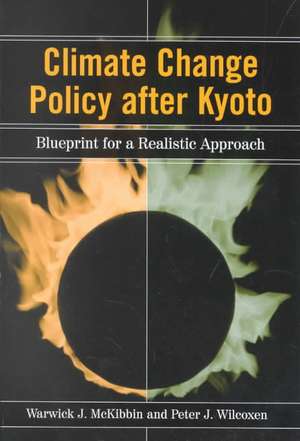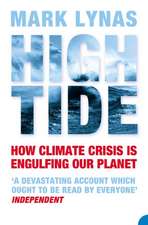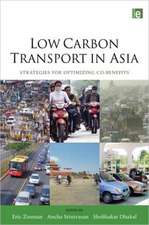Climate Change Policy after Kyoto: Blueprint for a Realistic Approach
Autor Warwick J. McKibbin, Peter J. Wilcoxenen Limba Engleză Paperback – 16 dec 2002
The Kyoto Protocol represents nearly a decade of international effort to reduce carbon emissions. While the treaty is the product of enormous international political effort, it has not been ratified by any major greenhouse emitter and it has been rejected by the United States. In this controversial new book, Warwick J. McKibbin and Peter Wilcoxen argue that the current approach of international negotiations on the Kyoto Protocol is going completely in the wrong direction. In Climate Change Policy after Kyoto, they attempt to steer the policy debate toward a realistic blueprint for effective policy. The authors believe that managing uncertainty—particularly the future costs of any plan—is key to realistic climate policy. They maintain that sustainable policy should meet four basic criteria: it should slow down carbon dioxide emissions where it is cost-effective to do so; compensate those who are hurt economically; require a high degree of consensus both domestically and internationally; and allow countries to enter the program easily and continue to participate even if they drop out of the agreement at certain times. The book summarizes the current state of knowledge about climate change and discusses the history of negotiations since 1992—in the process identifying the Kyoto Protocol as the wrong approach to the problem. It outlines important insights that economic theory offers for the design of climate policy, and uses those insights to develop a simple framework that will reduce greenhouse gas emissions while guaranteeing that short-run costs of compliance will not be excessive. The authors conclude by outlining a process by which international negotiations on climate control can proceed to an agreement that is both durable and feasible for all nations.
Preț: 223.03 lei
Nou
Puncte Express: 335
Preț estimativ în valută:
42.68€ • 44.50$ • 35.47£
42.68€ • 44.50$ • 35.47£
Carte tipărită la comandă
Livrare economică 21 martie-04 aprilie
Preluare comenzi: 021 569.72.76
Specificații
ISBN-13: 9780815706076
ISBN-10: 0815706073
Pagini: 133
Dimensiuni: 152 x 229 x 11 mm
Greutate: 0.21 kg
Ediția:New.
Editura: Brookings Institution Press
Colecția Brookings Institution Press
Locul publicării:United States
ISBN-10: 0815706073
Pagini: 133
Dimensiuni: 152 x 229 x 11 mm
Greutate: 0.21 kg
Ediția:New.
Editura: Brookings Institution Press
Colecția Brookings Institution Press
Locul publicării:United States
Notă biografică
Warwick J. McKibbin is a professor of international economics and head of the Economics Division at the Australian National University's Research School of Pacific and Asian Studies. He also is a nonresident senior fellow in the Economic Studies program at the Brookings Institution and a member of the board of the Reserve Bank of Australia. Peter J. Wilcoxen is an associate professor in the department of economics at the University of Texas, Austin, and a nonresident senior fellow in the Economic Studies program at the Brookings Institution.
Descriere
The Kyoto Protocol represents nearly a decade of international effort to reduce carbon emissions. While the treaty is the product of enormous international political effort, it has not been ratified by any major greenhouse emitter and it has been rejected by the United States. In this controversial new book, Warwick J. McKibbin and Peter Wilcoxen argue that the current approach of international negotiations on the Kyoto Protocol is going completely in the wrong direction. In Climate Change Policy after Kyoto, they attempt to steer the policy debate toward a realistic blueprint for effective policy. The authors believe that managing uncertainty—particularly the future costs of any plan—is key to realistic climate policy. They maintain that sustainable policy should meet four basic criteria: it should slow down carbon dioxide emissions where it is cost-effective to do so; compensate those who are hurt economically; require a high degree of consensus both domestically and internationally; and allow countries to enter the program easily and continue to participate even if they drop out of the agreement at certain times. The book summarizes the current state of knowledge about climate change and discusses the history of negotiations since 1992—in the process identifying the Kyoto Protocol as the wrong approach to the problem. It outlines important insights that economic theory offers for the design of climate policy, and uses those insights to develop a simple framework that will reduce greenhouse gas emissions while guaranteeing that short-run costs of compliance will not be excessive. The authors conclude by outlining a process by which international negotiations on climate control can proceed to an agreement that is both durable and feasible for all nations.








